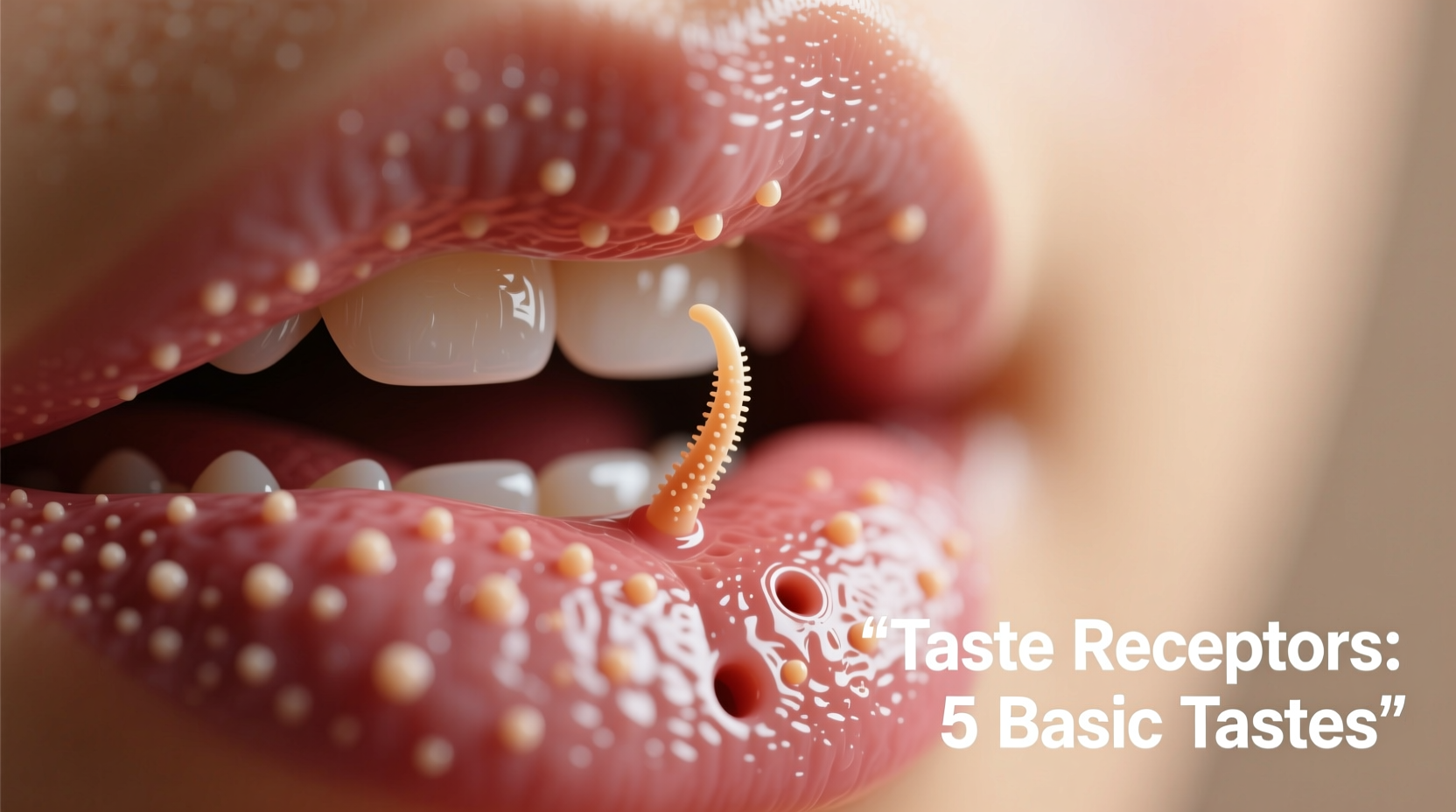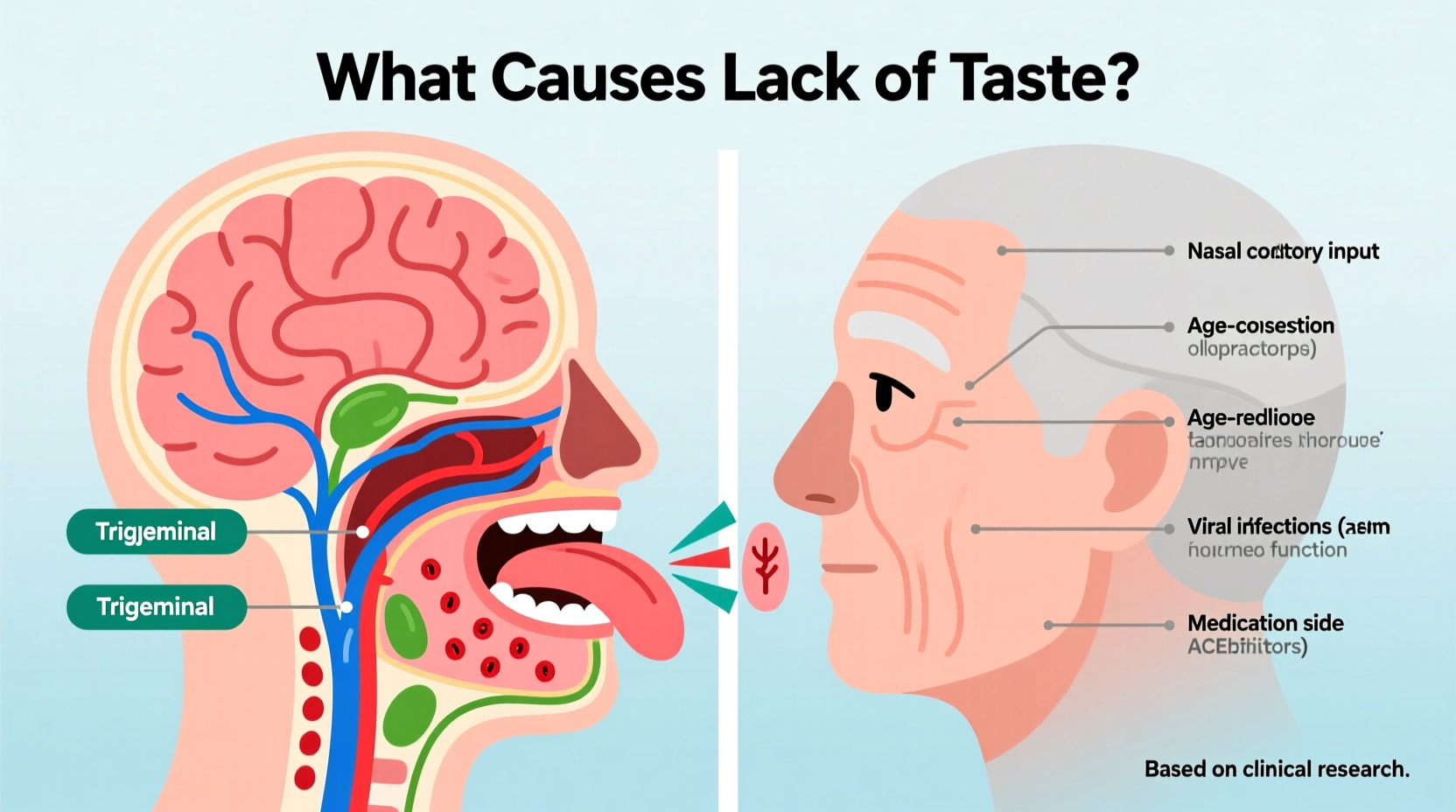Loss of taste (ageusia) most commonly stems from nasal congestion, viral infections like colds or COVID-19, certain medications, and dental issues. Over 88% of people experiencing sudden taste loss have temporary causes that resolve within weeks, while chronic cases often relate to neurological conditions, head injuries, or aging. Understanding the specific cause is essential for proper management and recovery.
Why Your Taste Sensation Might Be Failing: A Comprehensive Guide
When your favorite foods suddenly become bland or flavorless, it's more than just inconvenient—it affects nutrition, safety, and quality of life. Approximately 1 in 20 Americans experiences taste disturbances annually, with temporary issues being far more common than permanent conditions. This guide separates fact from fiction about taste loss causes, backed by current medical research and practical management strategies.
How Taste Actually Works: The Science Simplified
Taste isn't just about your tongue—it's a complex sensory system involving taste buds, olfactory receptors, and neural pathways. When you eat, chemical compounds interact with taste receptors that detect five primary sensations: sweet, salty, sour, bitter, and umami. Simultaneously, aromas travel through your nasal passages to olfactory receptors, contributing up to 80% of what we perceive as 'taste.' This explains why nasal congestion significantly impacts flavor perception.
Immediate Causes: What's Blocking Your Taste Right Now
Most taste disturbances are temporary and resolve once the underlying issue clears. These common culprits affect millions daily:
Nasal and Sinus Obstructions
When your nasal passages are blocked from allergies, colds, or sinus infections, aroma molecules can't reach your olfactory receptors. The American Academy of Otolaryngology reports that 75% of temporary taste loss cases stem from upper respiratory issues. Unlike popular belief, this isn't actually a 'taste' problem but a smell impairment that affects flavor perception.
Viral Infections and Post-Viral Effects
Cold and flu viruses cause inflammation that temporarily disrupts taste and smell pathways. During the pandemic, the CDC documented that 54-88% of COVID-19 patients experienced taste or smell disturbances, typically resolving within 2-4 weeks. Persistent post-viral taste issues beyond 4 weeks warrant medical evaluation.
| Cause | Prevalence | Typical Duration | Recovery Rate |
|---|---|---|---|
| Upper Respiratory Infections | 75% of cases | 1-4 weeks | 95% full recovery |
| Medication Side Effects | 25% of cases | Varies | 80% after medication change |
| COVID-19 Related | 54-88% of cases | 2-12 weeks | 90% within 6 months |
| Dental Issues | 15% of cases | 1-8 weeks | 98% with proper treatment |
Medication-Induced Taste Alterations
Over 500 medications list taste disturbance as a potential side effect. Common culprits include:
- Antibiotics (particularly tetracyclines and metronidazole)
- ACE inhibitors for blood pressure
- Statins for cholesterol management
- Chemotherapy drugs
- Antidepressants (SSRIs)
If you suspect medication is causing your taste issues, never stop taking prescribed medication without consulting your doctor. They may adjust dosage or switch medications.
Chronic and Serious Underlying Conditions
Persistent taste loss lasting beyond 4 weeks often indicates more significant health concerns requiring medical evaluation.
Neurological Factors
The facial, glossopharyngeal, and vagus nerves transmit taste information to your brain. Damage from stroke, Bell's palsy, or multiple sclerosis can disrupt this pathway. According to NIH research, approximately 12% of persistent taste disorders involve neurological components, often affecting one side of the tongue first.
Dental and Oral Health Connections
Gum disease, ill-fitting dentures, oral infections, and radiation therapy for head/neck cancers directly impact taste function. The Journal of Dental Research notes that 30% of taste disturbances in adults over 65 relate to dental issues or poor oral hygiene.
Aging and Taste Perception
Taste bud density decreases with age—by 60, most people have 50% fewer taste buds than in childhood. The National Institute on Aging reports that 75% of people over 80 experience some degree of taste impairment, often compounded by medication use and chronic conditions.

When to Seek Medical Attention: Critical Warning Signs
While most taste issues resolve spontaneously, certain symptoms require prompt evaluation:
- Taste loss persisting beyond 4 weeks without improvement
- Accompanying symptoms like facial weakness, vision changes, or severe headaches
- Inability to detect spoiled food or dangerous substances
- Sudden onset without apparent cause like recent illness
Your primary care physician can conduct initial assessments and may refer you to an otolaryngologist (ear, nose, and throat specialist) or neurologist for further testing. Diagnostic approaches often include taste identification tests, blood work, and imaging studies when neurological causes are suspected.
Practical Management Strategies While Recovering
During temporary taste loss, these evidence-based approaches can improve your experience:
Nutritional Adjustments for Flavor Enhancement
Focus on texture, temperature contrast, and visual appeal to compensate for reduced taste:
- Add citrus zest or vinegar for brightness without relying on salt
- Incorporate crunchy elements like nuts or seeds for textural interest
- Use aromatic herbs (rosemary, thyme) that stimulate remaining olfactory function
- Experiment with temperature contrasts (warm soup with cool yogurt swirl)
Oral Hygiene Optimization
Maintaining excellent oral health supports taste recovery:
- Brush tongue gently with soft toothbrush twice daily
- Rinse with baking soda solution (1 tsp in 8 oz water) to neutralize pH
- Avoid alcohol-based mouthwashes that can dry oral tissues
- Stay hydrated to prevent dry mouth, which exacerbates taste issues
Recovery Timelines: What to Expect
Understanding typical recovery patterns reduces anxiety and helps set realistic expectations:
| Primary Cause | Initial Improvement | Full Recovery Timeline | Factors That Speed Recovery |
|---|---|---|---|
| Cold/Flu Related | 3-7 days after congestion clears | 2-4 weeks | Hydration, zinc supplementation, nasal irrigation |
| Post-COVID | 2-8 weeks | 1-6 months | Smell training, vitamin A supplementation |
| Medication Related | Variable | Days to weeks after medication change | Working with doctor on alternatives |
| Dental Related | 1-2 weeks after treatment | 2-8 weeks | Professional dental cleaning, improved oral hygiene |
Smell training—a technique involving daily exposure to strong scents like lemon, rose, clove, and eucalyptus—shows promise for accelerating recovery in post-viral cases. A 2022 JAMA Otolaryngology study found that consistent smell training improved recovery rates by 30% compared to natural recovery alone.
Preventing Permanent Taste Damage
While not all causes are preventable, these strategies reduce your risk:
- Practice good oral hygiene with regular dental checkups
- Use protective headgear during contact sports
- Discuss medication alternatives with your doctor if taste changes occur
- Avoid exposure to toxic chemicals without proper protection
- Manage chronic conditions like diabetes that affect nerve function
Frequently Asked Questions
Can zinc supplements help restore taste function?
Zinc deficiency can cause taste disturbances, and supplementation helps in deficiency cases. However, indiscriminate zinc use isn't recommended—excess zinc can actually worsen taste. Consult your doctor for testing before supplementing, as the NIH reports only 5-10% of taste loss cases relate to zinc deficiency.
Why does food taste metallic during taste disturbances?
Metallic taste (dysgeusia) often indicates neurological disruption or medication side effects. It's commonly reported with chemotherapy, certain antibiotics, and neurological conditions. This phantom taste occurs when nerve signals become misinterpreted by the brain. Most cases resolve when the underlying cause is addressed.
How does smoking affect taste perception?
Smoking damages taste buds and reduces blood flow to oral tissues, diminishing taste sensitivity by up to 50% according to American Heart Association research. Within 48 hours of quitting, taste perception begins improving as nerve endings regenerate. Complete recovery may take several months depending on smoking duration and intensity.
Can diabetes cause permanent taste loss?
Uncontrolled diabetes can damage nerves involved in taste perception through diabetic neuropathy. The Journal of Diabetes and Its Complications reports that 30% of long-term diabetics experience some degree of taste impairment. Maintaining good blood sugar control prevents progression, but existing nerve damage may be irreversible.
Are there specific foods that help restore taste function?
While no single food restores taste, certain nutrients support recovery. Vitamin A-rich foods (sweet potatoes, carrots) help regenerate taste bud cells. Zinc sources (oysters, pumpkin seeds) aid nerve function. Citrus fruits stimulate saliva production. Focus on varied, nutrient-dense foods rather than specific 'cure' foods for best results during recovery.











 浙公网安备
33010002000092号
浙公网安备
33010002000092号 浙B2-20120091-4
浙B2-20120091-4